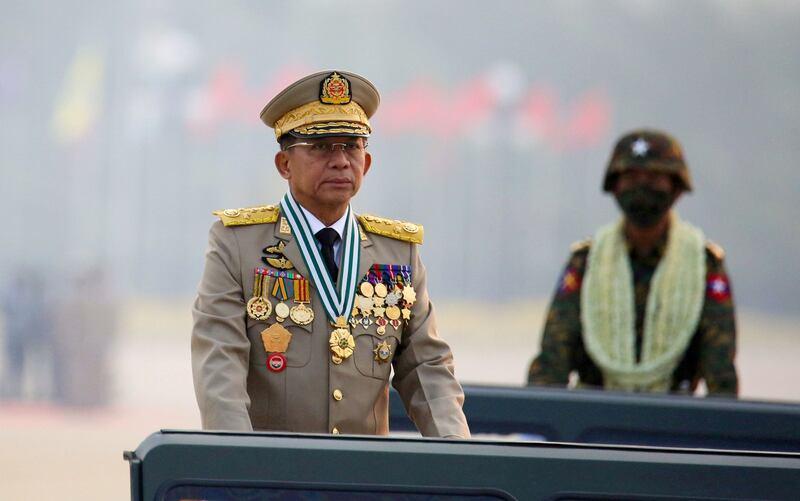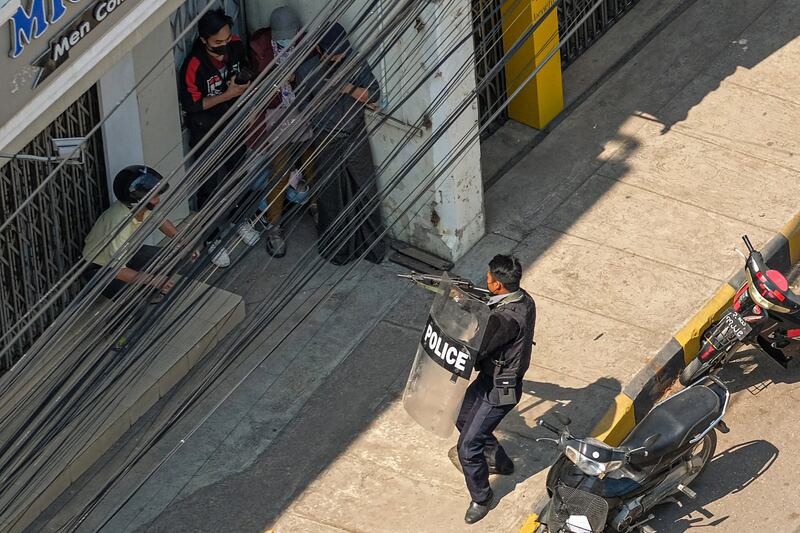In the six months after seizing power in a coup, Myanmar’s military regime committed widespread and systematic crimes against humanity, according to a damning new report that identified dozens of junta officials it said should be investigated for their alleged roles in the atrocities.
The 193-page report, entitled "Nowhere is Safe" and published Wednesday by the Southeast Asian rights group Fortify Rights and the Schell Center for International Human Rights at Yale Law School, draws on more than 120 testimonies and leaked documents to detail how the junta murdered, imprisoned, tortured, disappeared, forcibly displaced, and persecuted civilians for months following its Feb. 1, 2021 putsch.
The report provides some of the most in-depth legal analysis of the atrocities in the aftermath of the coup to date and asserts that they meet the standard required by The Hague-based International Criminal Court (ICC) to issue an arrest warrant. It comes a week after a U.N. report concluded that the Myanmar army was responsible for war crimes and crimes against humanity. The junta has yet to respond, but has previously dismissed such accusations as foreign interference based on falsehoods.
In a statement accompanying its release, U.N. Special Rapporteur on the situation of human rights in Myanmar Tom Andrews said that Fortify Rights and the Schell Center had compiled key evidence that could one day be used to deliver justice to the junta’s victims.
“Published just days prior to the first anniversary of the Armed Forces Day Massacre, this report provides the international community a better understanding of the junta’s crimes, the individuals responsible, and their battalions’ locations in relation to attacks,” said Andrews, Robina Senior Fellow at the Schell Center, and author of the foreword to the report.
“This pivotal report on the junta’s horrendous crimes can help guide efforts to ensure accountability,” he added, calling on United Nations member states to “ensure accountability for these ongoing atrocities.”
On March 27, 2021, Myanmar's security forces killed more than 100 pro-democracy protesters in the bloodiest day since the coup, as the junta staged a show of might on its annual Armed Forces Day. In the nearly 14 months since seizing power, authorities have killed at least 1,700 civilians and arrested more than 9,870 – mostly during peaceful anti-junta protests, according to the Assistance Association for Political Prisoners, a human rights organization based in Thailand.

Officials identified
In their report, Fortify Rights and the Schell Center identified 61 senior military and police officials they said are potentially liable for crimes against humanity, including junta chief Snr. Gen. Min Aung Hlaing, Deputy Commander in Chief Vice Senior General Soe Win, and the Joint Chief of Staff General Mya Tun Oo. The men are also responsible for what the U.S. Biden administration on Monday determined to be genocide and crimes against humanity against the Rohingya in Rakhine state in 2016 and 2017.
Other military and police suspects identified in the report are 19 Regional Commanders of the Police Force, 13 Regional Commanders from the military, and 27 other senior officials from the junta.
Only 20 of the 61 officials have been sanctioned by at least one government, according to Fortify Rights and the Schell Center.
“All individuals responsible for these crimes should be sanctioned and prosecuted,” said Matthew Smith, Chief Executive Officer at Fortify Rights and co-author of the report.
“Governments should revamp and calibrate their foreign policies to support the people of Myanmar in ending the military’s attack. Governments should acknowledge the [shadow] National Unity Government of Myanmar, end weapons transfers to the military, and create conditions to ensure international jurisdiction over these crimes.”
The report also provides new details of the junta’s chain of command during the crackdown, including Min Aung Hlaing’s establishment of a “Special Command” in Naypyidaw, led by four senior generals, that had sole authority to deploy and command troops in civilian areas.
Active-duty military personnel critical of junta rule helped Fortify Rights and the Schell Center to establish the locations of 1,040 military units nationwide in their report, which could be used by prosecutors and policymakers geo-locate alleged perpetrators vis-a-vis crime scenes throughout the country.
In addition to collecting testimonies, Fortify Rights collected 1,153 data points of open-source information about specific incidents of human rights violations uploaded by Myanmar citizens.

Call for global response
In its examination of the evidence, the Schell Center found that from February to July 2021, forces under the junta’s command conducted “a widespread and systematic attack directed against a civilian population with knowledge of the broader attack.” Based on its findings, “there are reasonable grounds to believe that the junta committed crimes against humanity” as defined by the Rome Statute, the international treaty that led to the establishment of the ICC.
Among 28 recommendations made in their report, Fortify Rights and the Schell Center called on governments to ensure international justice for past and ongoing atrocity crimes Myanmar and to push the U.N. Security Council to refer the situation there to the ICC.
The report also urged U.N. Security Council member states to support a resolution to impose a global arms embargo on the Myanmar military – a recommendation U.N. Special Rapporteur Andrews made to the council in a report last month, saying that weapons purchased by the junta are almost certainly being used to kill innocent people.
Additionally, the report said governments should impose targeted sanctions against military-owned enterprises and block the junta’s access to natural gas revenues and access to financial services.
“The Myanmar military poses a threat to international peace and security,” said Roger Polack, Schell Center Visiting Human Rights Fellow and co-author of the report.
“The Security Council must live up to its mandate to respond to such threats—and must discharge its responsibility to protect—by putting forward a resolution that imposes the recommendations in this report.”
Polack said that absent action by the council, its member states should coordinate a similar response.
“Without a concerted effort to stop ongoing atrocities and to hold the junta accountable for the crimes it has committed to date, the junta will undoubtedly continue to persecute its opponents, murder civilians, and devastate the social, health, and economic well-being of Myanmar,” he said.

